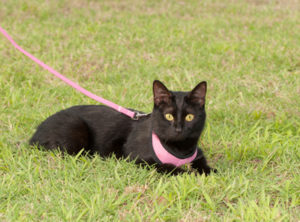Keep your cats indoors to protect them from outside dangers.

©mariesacha/Adobe Stock
Your cat sits by the back door, looking plaintively outside and meowing in her best “please let me outside” voice. You want to provide the best life for your cat, and you wonder if being able to play and explore outside will add to her quality of life. Before you invite her to play outside, however, consider the dangers that may await her outside your home.
Indoor-only cats typically live longer lives than cats who go outside. In fact, the average life span of an outdoor cat is 3 to 5 years, while that of an indoor cat is well over 10 years. An outdoor cat’s life may be shortened by:
- Being hit by cars
- Being attacked by dogs or other outdoor wildlife
- Suffering wounds from fights with other outdoor cats
- Contracting feline diseases from other outdoor cats
- Getting fleas, ticks or other pests
- Becoming lost or stolen

©avirid /Adobe Stock
If you adopted a cat who was already accustomed to being outside, and providing her with ample cat trees, window perches and interactive cat toys, and plenty of daily play time with you isn’t working, you could opt for controlled outdoor excursions. You could leash-train your cat for trips to the backyard and beyond.
To leash train your cat, follow these steps:
- Buy a harness specifically designed for cats.
- Make sure you are in the right frame of mind to train your cat. By approaching leash training with a calm, peaceful attitude, you can encourage your cat to be open to the experience.
- Select a safe place inside to start training, and make it as welcoming to your cat as possible.
- Over a period of time, in small daily sessions lasting 10 to 15 minutes, move through the stages of placing the harness on your cat. Such steps include:
- Placing the harness around your cat’s body.
- Gently buckling the harness in place.
- Adjusting the straps so the harness fits snugly around your cat’s body. The optimum fit allows you to fit no more than two fingers between the harness and her body.
- Reward your cat with praise and a small treat at each progressive step while you introduce the harness.
- When your cat is comfortable wearing the harness, attach the leash. This step takes place indoors, too, in an area that is clear of obstacles. Let her walk around with the leash dragging behind her, and reward her with praise and a treat. Repeat this process several days in a row, and be sure to stay in the room with her.
- Next, hold the leash while your cat walks around the house. Let her go where she wants, and simply hold the leash loosely without pulling or tugging on it.
- You might be content to let your cat direct all your walks outdoors. If so, when your cat is comfortable walking about the house with you holding the leash, consider taking your next short walk outdoors, in a quiet spot such as your backyard. If you hope to gently guide your cat during your outdoor excursions, employ these next few steps suggested by the American Society for the Prevention of Cruelty to Animals (aspca.org) before heading outdoors:
- While your cat is wearing the leash, walk a few feet away from him. Gently ask her to follow you in a calm voice.
- Drop a treat on the ground at your feet. When she comes over to eat it, walk away to the end of the leash.
- Call to her again, and when her comes over to you, praise her and give him another treat. Repeat this process many times.
- If your cat tries to go in a different direction, apply gentle, persistent pressure on the leash and wait patiently. When she takes a few steps toward you and the leash goes a bit slack, praise her and give him a treat.
- With your cat accustomed to your gentle guidance, begin taking short walks outside.

©pimmimemom/Adobe Stock
You might also want to investigate purchasing or constructing an outdoor enclosure for your cat, so she can enjoy the outdoors without encountering the dangers that can lurk outside. Some companies offer window boxes that are accessed from inside the house and allow you cat to nap in the sunshine and fresh air. Others offer ledges that fit onto a window’s indoor sill, giving your cat a place to perch with a view outside.
Does your cat still stand by the back door, meowing to go out? If you’ve created safe situations for your feline friend to have a taste of the outdoors and it still doesn’t seem to satisfy his love for the outdoors, your cat’s hormones may be to blame. If you haven’t already, have your cat spayed or neutered to curb his (or her) hormonal-driven desire to seek out romantic encounters with other cats.
About the Author: Stacy N. Hackett is an award-winning writer with more than 25 years’ experience in the pet industry. She is the former editor of Pet Product News and a former staff editor with Cat Fancy, Cats USA, Critters USA and Ferrets USA. To learn more about her work, visit stacynhackett.vpweb.com.





